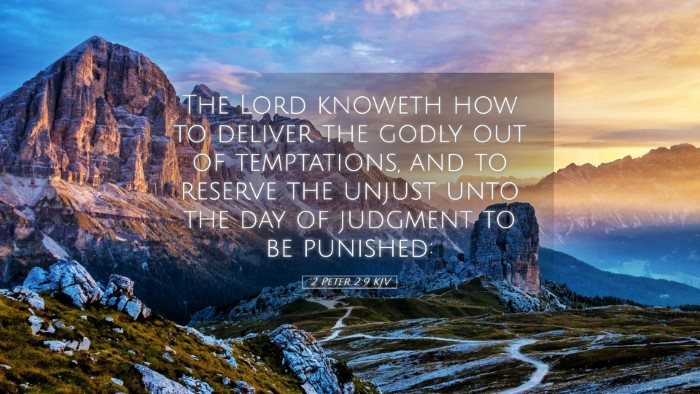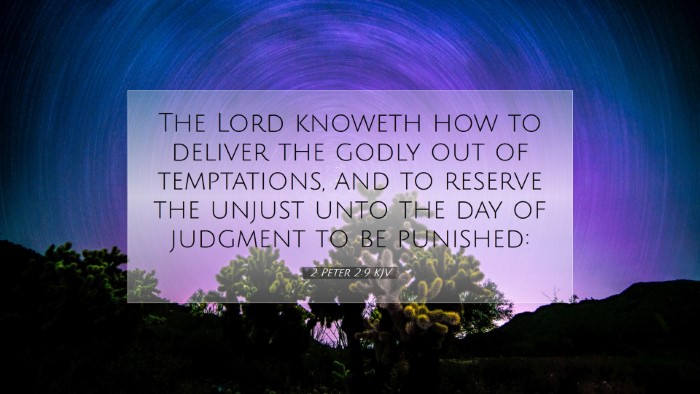Old Testament
Genesis Exodus Leviticus Numbers Deuteronomy Joshua Judges Ruth 1 Samuel 2 Samuel 1 Kings 2 Kings 1 Chronicles 2 Chronicles Ezra Nehemiah Esther Job Psalms Proverbs Ecclesiastes Song of Solomon Isaiah Jeremiah Lamentations Ezekiel Daniel Hosea Joel Amos Obadiah Jonah Micah Nahum Habakkuk Zephaniah Haggai Zechariah Malachi2 Peter 2:9
2 Peter 2:9 KJV
The Lord knoweth how to deliver the godly out of temptations, and to reserve the unjust unto the day of judgment to be punished:
2 Peter 2:9 Bible Commentary
Commentary on 2 Peter 2:9
2 Peter 2:9 states: “The Lord knows how to deliver the godly out of temptations, and to reserve the unjust unto the day of judgment to be punished.” This verse stands as a profound assurance of divine providence, emphasizing both God's care for the righteous and His justice towards the wicked.
Overview of the Verse
This verse encapsulates two critical aspects of God's character: His ability to rescue the faithful and His judgment upon the unrepentant. The dual themes of deliverance and judgment illustrate the dichotomy of God’s nature and His dealings with humanity.
Insights from Matthew Henry
God's Omniscience and Care: Matthew Henry emphasizes that God's omniscience enables Him to discern between the righteous and the wicked. He notes that the phrase "The Lord knows" signifies not merely awareness, but an intimate knowledge and recognition of His people. He is actively involved in the lives of the godly, guiding and protecting them amid trials.
Deliverance from Temptations: Henry elaborates that temptations serve as tests of faith. God provides a way of escape for the believers, ensuring that their trials do not exceed their ability to withstand. He reassures readers that while trials are a part of life, God's power is greater than any temptation.
Insights from Albert Barnes
Assurance of Deliverance: Albert Barnes comments on the significance of the word "deliver," noting that it implies both physical and spiritual rescue. He points out that God's intervention is timely and specific, often corresponding to the believer's dire need. God's ability to deliver is not only a matter of historical accounts but a continuous truth experienced by believers today.
The Judgment of the Unjust: Barnes also underscores the certainty of divine judgment. He points out that the unjust are "reserved" for punishment, illustrating that God's justice does not overlook wrongdoing. The day of judgment is inevitable, and those who rebel against God's righteousness will face consequences. This remains a central tenet of Christian faith, warning against complacency in sin.
Insights from Adam Clarke
The Character of God: Adam Clarke elaborates on the nature of God as both merciful and just. He offers a detailed exploration of the terms “godly” and “unjust,” defining the former as those who fear and serve God, while the latter comprises those wicked individuals who live in disregard for divine authority. Clarke emphasizes that God's promises of deliverance are intended to inspire holy living among believers.
Interpretation of 'Temptations': Clarke interprets “temptations” as not just external trials, but also internal struggles against sin. He states that God uses these challenges to strengthen faith, providing His grace to overcome. The understanding here is holistic—recognizing how God works through both the external pressures of life and the internal conflicts of the soul.
Theological Reflections
This verse invites a deeper theological reflection on the nature of divine justice and mercy. It offers comfort to believers by assuring them that God is actively engaged in their struggles, while also serving as a stern warning to those who persist in unrighteousness.
1. The Nature of God’s Deliverance
- Divine Providence: The phrase "The Lord knows how to deliver" underscores God's providential care over His creation. It suggests that nothing is outside of God's awareness or control.
- Mechanisms of Deliverance: God may deliver His people through supernatural interventions, wise counsel, or the comfort of His presence. Believers are encouraged to trust in God's readiness to rescue them in times of need.
2. The Reality of Judgment
- Certainty of Consequences: The unjust are set aside for punishment, reassuring the faithful that justice will ultimately prevail. This serves both as a warning and a comfort.
- Call to Righteousness: The reality of impending judgment highlights the importance of living a godly life, encouraging self-examination and repentance as necessary responses to God's call.
Practical Applications for Believers
As we reflect on 2 Peter 2:9, several practical applications emerge for pastors, students, theologians, and scholars:
- Encouragement in Trials: Believers ought to find solace in the knowledge that God intimately knows their struggles and is capable of delivering them.
- Advocacy for Justice: The assurance of divine judgment should compel believers to advocate for justice in their communities, reflecting God's character in their actions.
- Holistic Spiritual Growth: Understanding the duality of deliverance and judgment promotes a balanced spiritual life, where believers pursue godliness while recognizing the seriousness of sin.
- Teaching and Preaching: Pastors should emphasize both aspects of this verse when teaching, ensuring that their congregations are equipped to handle temptations while understanding God's righteous standards.
Conclusion
In conclusion, 2 Peter 2:9 is a concise yet profound reminder of the character of God as the deliverer of the faithful and the judge of the unfaithful. The insights drawn from esteemed commentators provide a comprehensive understanding that is invaluable to those in the ministry and academic study of Scripture. As believers navigate the complexities of life, they are called to trust in God's deliverance and remain steadfast in righteousness, recognizing the eternal implications of their choices.


